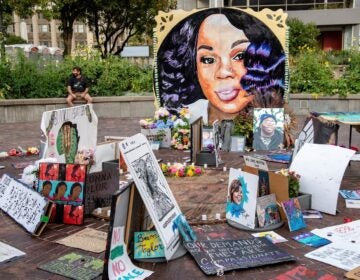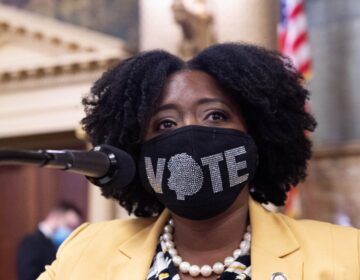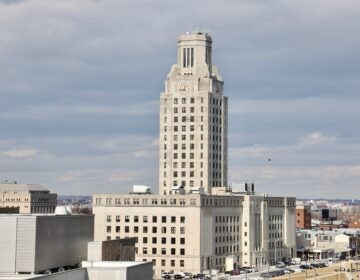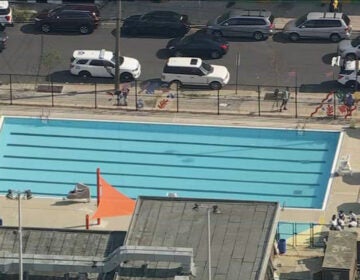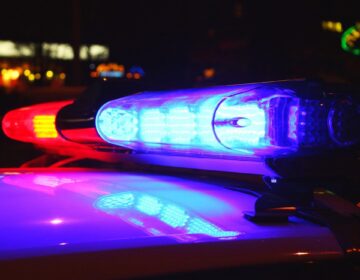Philly pastor who confronted Trump fights gun violence on city streets and over Zoom
Day is one of a growing number of local church leaders on the frontlines of the city’s ongoing battle against gun violence.
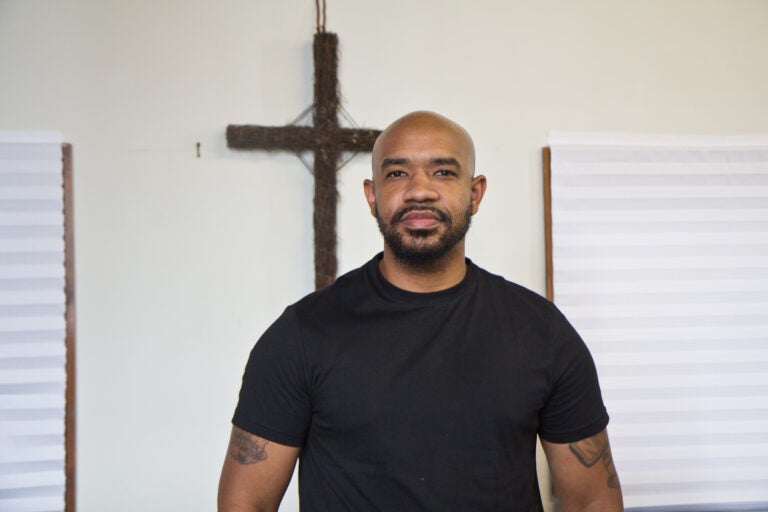
Carl Day is the Pastor of Culture Changing Christians Worship Center in North Philadelphia. (Kimberly Paynter/WHYY)
Rev. Carl Day isn’t just another minister lecturing people to turn in their weapons during this crushing swell of gun violence in the city. At 23, he was writhing through the same quicksand of aggression as them. He was charged with attempted murder. Then two months later, he was arrested for committing armed robbery with a .45 caliber handgun, after an argument over money.
Today at 35, Day calls himself “pastor of the hood.” He is one of a growing number of local church leaders on the frontlines of the city’s ongoing battle against gun violence.
Several nights a week, Day returns to his old neighborhood at 28th and Taylor Streets and surrounding areas where he sees guys standing on corners and introduces himself. He asks questions like, how many children do you have, what happens to your children if you go away for a while, and do you have bail money. “I don’t say ‘you gotta get off the corner,’ that’s antiquated,” he said. “I don’t use a fire-and-brimstone approach.”
Before COVID-19, Day, the lead pastor of Culture Changing Christians Worship Centers in North Philadelphia and Montclair, met with men between the ages of 12 and 17 in person every day after school. “These are the most violent hours,” said Day, who has more than 7,000 followers on Instagram, where #pastorofthehood is a common hashtag for him.
After the pandemic started, Day stopped holding those meetings in church. Yet his program, Cast Offs to Conquerors, continues gathering for daily virtual hangouts on Zoom. Day, who recently made headlines for confronting President Donald Trump about his slogan, “Make America Great Again,” attracts dozens of young men to his Zoom sessions.
Church leaders and anti-gun violence advocates fight against the carnage
Rev. Dr. Alyn E. Waller, senior pastor of Enon Tabernacle Baptist Church in East Mount Airy, believes in taking a proactive approach to violence reduction. If young people are on the church’s football or basketball teams, or on the cheerleading squad, they are not on the street doing something else, Waller said. “Ministry today is about trauma management and exposure. Inspiring young people, helping them see another way,” he said.
As of this report, 337 homicides have occurred in Philadelphia since the start of the year — a 35% increase in deaths over the same period last year. Gun crimes have steadily increased since 2017, with the number of homicides now at its highest since 2007. The shootings happen at all times of day and in just about every neighborhood, according to the Philadelphia Police Department.
Bryan Miller wants to stop the current mushrooming of gun violence — a crisis that brings back the trauma of losing his brother.
When his brother, Michael Miller, went to his desk job on November 22, 1994, as an FBI Special Agent in the Cold Case Homicide Squad, he expected to be safe. After all, he transferred there six months earlier to avoid the violence of field work in the Gun Violence Unit. But that day, a 19-year-old triple-murder suspect ran into the station with a Mac-10 semi-automatic assault weapon and delivered a fatal shot to Miller’s head, and multiple blasts to his partner, and their sergeant, before also killing himself with the 30-magazine pistol.
To hopefully one day spare another family the grief he experienced, Miller became a gun violence-prevention advocate. He served as the executive director of Ceasefire NJ before founding and becoming the executive director of Heeding God’s Call to End Gun Violence, an interfaith organization of Christians, Jews and Muslims. Members of his nonprofit group display a traveling collection of t-shirts on church lawns they call the Memorial to the Lost. Each shirt has the name and death date of a gun violence victim. There have been 200 requests for the installation of t-shirts that resembles a cemetery over the past 11 years, Miller said.
Possible causes for the upsurge in gun violence
Miller ties the bloodshed on Philadelphia streets to the availability of illegal guns. “It’s easy to acquire guns from illegal dealers and traffickers,” he said. “Everyone should understand the difference between feeling safe and being safe. The person most likely to be shot is the person possessing a gun because the other person will shoot you first.”
Waller describes a deadly cycle linked to limited economic opportunity. “Violence comes from somewhere. Wherever you have lack of education, lack of job opportunities, violence is going to be there,” he said. “When people don’t make good money or fair money they’re going to look to other ways. People look to the drug trade [which] begets violence.”
“God will allow plagues to happen to a people,” Waller added. “When I look at violence, pandemic, and earthquakes, I am fundamentally confident that we are dealing with plagues. One of the greatest things to change the plight of people is to change leadership. I believe that we are miraculously going to see the changing of times when that happens.
Rev. Laurence Tom (LT) serves as the pastor of the Chinese Christian Church + Center in Philadelphia.
“This uptick in violence is a perfect storm of things … violence is just an expression of all the things that have been happening under the surface,” Tom said “The virus definitely exasperated a lot of feelings and tensions that already existed for a number of years. “
Day believes gun violence is an indication of the perpetrator’s mentality and lack of conflict-resolution skills. “[People] learn to handle conflict with violence,“ he said. “People don’t feel they have a lot to live for. Hopelessness mixed with self-medication leads to violence.”
Pastors work on subsiding homicide rates
Waller has merged forces with the city to help decrease the rise in gun violence. He recently hosted the Pathways to Reform, Transformation and Reconciliation monthly meeting and serves on the steering committee for the Philadelphia-run board with Day. “It’s a multidisciplinary approach to partnering with the Department of Human Services, the police force, and other government agencies to identify perpetrators and go to them offering them services and another way out of the choices in their lives,” he said.
Rev. David Brown, who pastored United Methodist Church of the Redeemer in Northeast Philadelphia for 31 years and now chairs the Philadelphia chapter of Heeding God’s Call to End Gun Violence, believes there are concrete policy changes that could reduce the bloodshed. These include:
- universal gun checks,
- 24-hour waiting period to purchase guns, and
- banning assault weapons.
“There is a need for the faith-based community to make itself heard about both the causes and means of prevention of gun violence,” he said.
Day, meanwhile, is part of a collective coalition of pastors who plan to meet outdoors every Friday evening in a different section of the city to hold a church service. “We’ll worship God outside and bring love to the city,” Day said. “Everyone will be asked to wear a mask and practice social distancing. Music is going to be a major part of the service because music is therapeutic.”
But some church leaders harbor concerns that people who don’t live in Philadelphia are contributing to the rise in homicides.
“It wouldn’t surprise me if people were coming here and shooting up the city,” Day said.
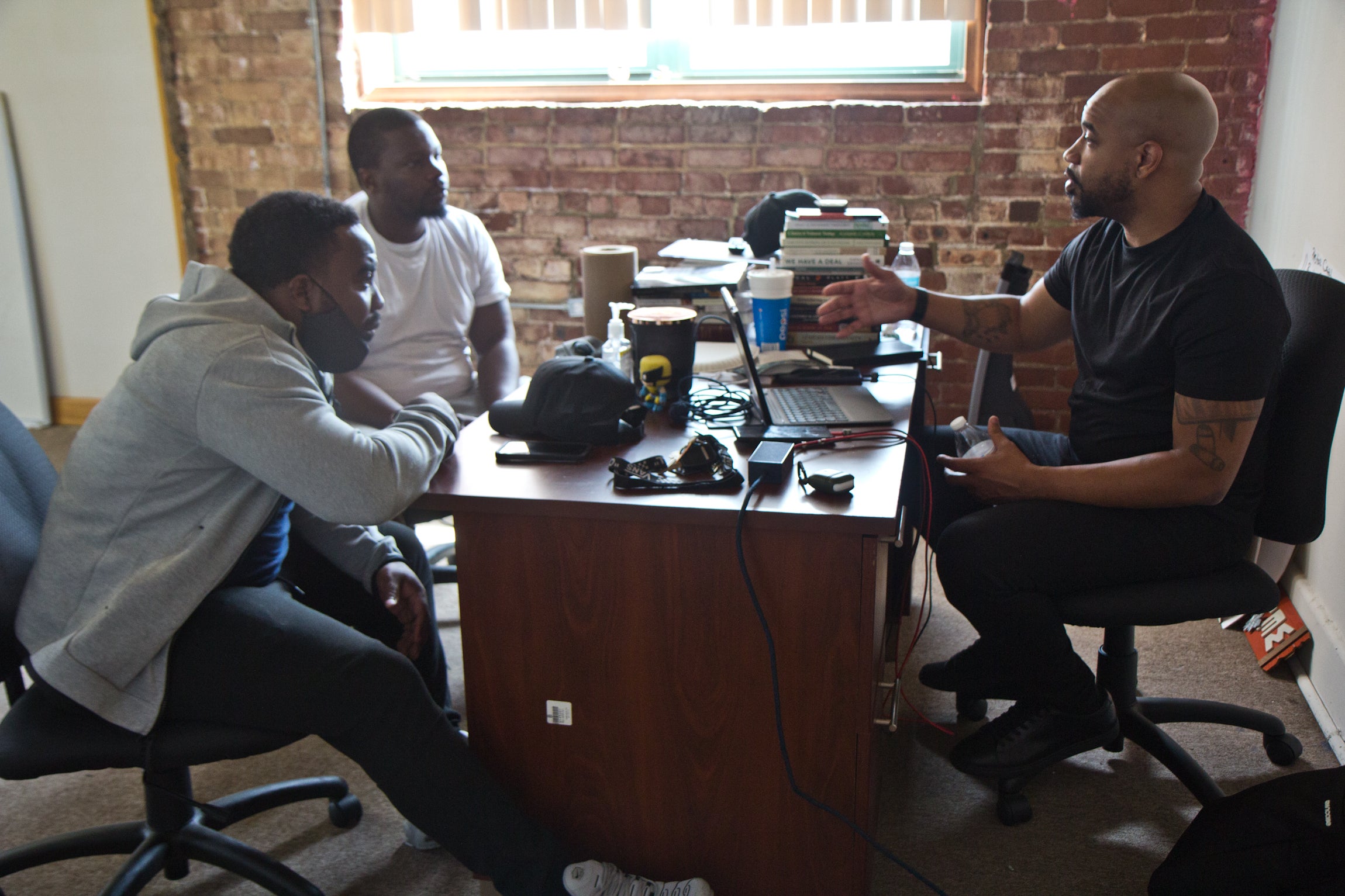
Waller said that while he has no proof of outside agitators coming in to create violence, “there are a lot of forces that gain from an impoverished and oppressed Black community. “
“During the looting we know that there were anarchists or outside groups that came here to frustrate the very peaceful, intentional uprising,” Waller said. “Some of these anarchists’ groups were racist in nature trying to taint the truth about the uprising and the Black Lives Matter Movement.”
A spokesperson for the Philadelphia Police Department declined to comment on the idea that outside agitators are involved.

Subscribe to PlanPhilly
WHYY is your source for fact-based, in-depth journalism and information. As a nonprofit organization, we rely on financial support from readers like you. Please give today.



